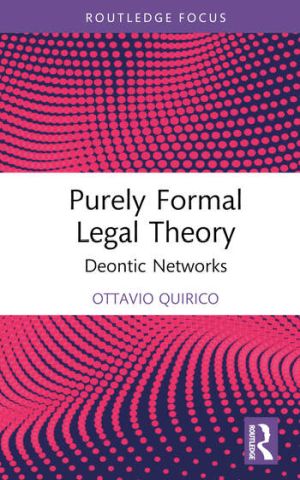
This book elaborates on deontic logic and network theory to present a reductionist theory of the law, disclosing a simple understanding of legal norms based on minimum necessary and sufficient notions. The analysis explores the concept of a ‘norm’ as a claim-obligation relation that regulates conduct, that is, action and inaction, among subjects, in space and time. Based on these five minimum notions, the study illustrates legal systems as networks of substantive right-duty relations that are procedurally organised according to time. The research relies on basic Kripke-style semantics as social matrixes to explain fundamental normative concepts and further on network science, social network theory and graph-theoretic notation, based on ties and nodes, to elaborate a formal representation of minimum necessary notions and of legal systems as deontic networks.
The book will be of interest to academics, researchers and practitioners working in the areas of Legal Philosophy, Legal Theory and International Law.